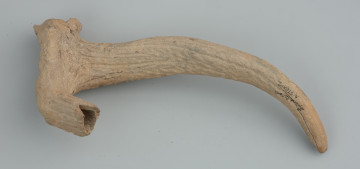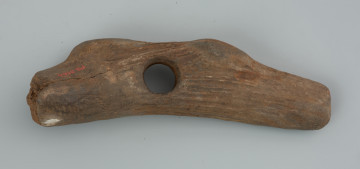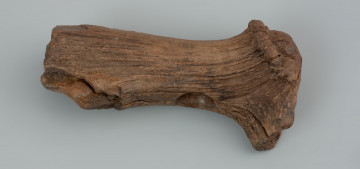
Holder
9600 p.n.e. — 5400 p.n.e.
National Museum in Szczecin
Part of the collection: Stone Age
The hoe made of red deer antlers was found in unknown circumstances in Szczecin, in the Bay of Łęczna on Lake Dąbie in 1943.The lack of a preserved rose - part of the antler near the skull, makes it impossible to determine whether the hoe was made from a drop or a hunted individual. However, it is known that it was made from the centre of the pedicle by cutting and breaking off the necessary part. Then, using a bow drill, a hole was drilled, and a blade was formed. The hole for setting the handle was drilled on two sides, so it is slightly asymmetrical. The different diameters of the holes on the two sides of the relic also suggest two different drills. Numerous traces of use have been preserved on the tool, mainly very intensive lapping and surface breakages visible on the blade and directly at it. There are cracks visible on the hoe face, which allows the assumption that it was also used as a hammer. On the surface, there are also traces indicating repeated repairs with flint tools. Contrary to their name, Mesolithic antler hoes were used not only for digging but also for other works. They were versatile tools used as pickaxes and diggers, spades for breaking holes in the ice, blows and axes for working wood, cleavers for splitting animal carcasses, or hammers for breaking bones and driving wooden pegs. All these activities left characteristic marks on the tools, which can now be observed under a microscope. The term 'hoe' refers mainly to the position of the blade in relation to the handle opening (transverse in the case of hoes, parallel in the case of axes), but not to the function of the tool.
Michał Adamczyk
Author / creator
Dimensions
cały obiekt: height: 17.2 cm, width: 5.1 cm
Object type
hoe
Technique
broaching, planing, scraping, drilling, breaking, setting, softening
Material
red deer antlers
Origin / acquisition method
acquisition
Creation time / dating
Creation / finding place
Owner
National Museum in Szczecin
Identification number
Location / status

9600 p.n.e. — 5400 p.n.e.
National Museum in Szczecin

9600 p.n.e. — 4100 p.n.e.
National Museum in Szczecin

9600 p.n.e. — 4100 p.n.e.
National Museum in Szczecin
DISCOVER this TOPIC
National Museum in Lublin
DISCOVER this PATH
Educational path